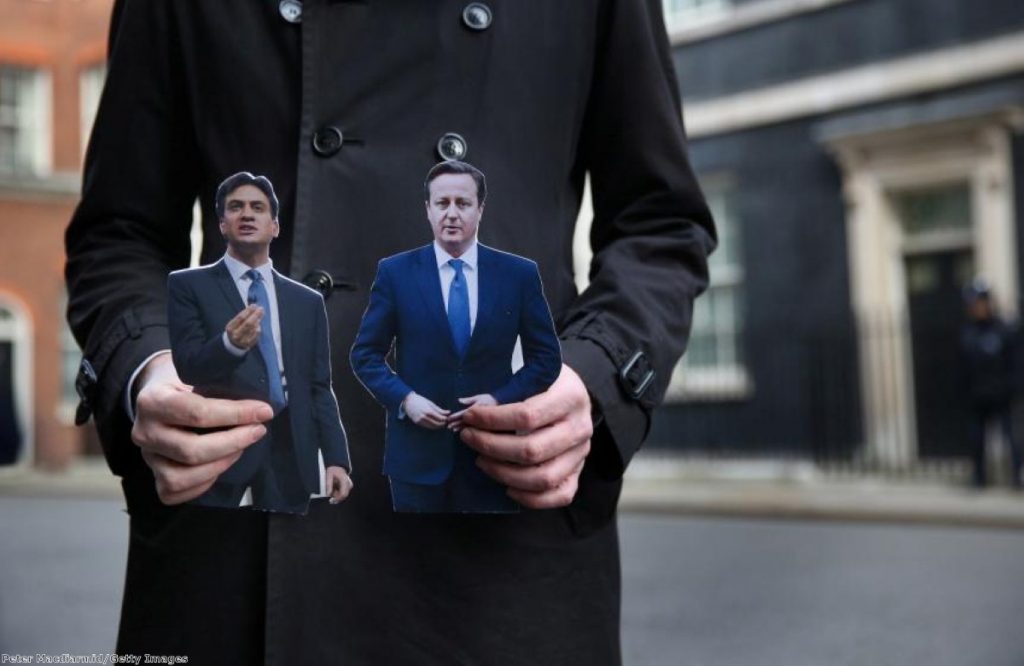TV debates confidential: In search of a soundbite
By Kevin Morrell
This evening David Cameron and Ed Miliband will dream of delivering the killer soundbite that is the moment their debate is remembered for.
In the US, which has a longer tradition of television debates, a prime example was Lloyd Bentsen's dismissal of fellow vice presidential candidate Dan Quayle: "Senator, you're no Jack Kennedy." Killer soundbites are not simply down to natural flair or luck; they are crafted. But how?
Soundbites are sharply defined phrases with very clear boundaries and this is key to their being remembered and quoted. One approach, pioneered by Professor Max Atkinson in Our Master's Voices, suggests there are certain rhetorical formats which act as a kind of wrapper that gives a phrase definite boundaries. Here's a few of them.
'Position-taking'
This is likely to feature more heavily at the start and end of answers in the debate.
Stating a position tells us what a leader stands for. It lets us know about their roots and values, or that they are best placed to address present crises, or that they are in touch with the electorate.
To identify position-taking, listen for phrases that are markers of time – 'today', 'tonight', 'as we speak', 'five years ago', 'I remember when' – or markers of place like 'Britain' or 'our country'.
Any reference to the opposition usually signals position-taking too. A formidable example of position taking was Margaret Thatcher's phrase "the lady's not for turning", used in a 1980 speech and seen as a turning point in her time as prime minister.
'Contrast'

This helps create a sense of conviction: you are more clearly for something if you are against the opposite.
Leaders can use contrast to create shared identity by naming, inventing or exaggerating a common threat to an enemy or rival.
The basic contrast in elections is 'vote for us, or face disaster'. Tony Blair's "24 hours to save the NHS", used in his 1997 victory, proved a memorable example.
During a campaign an opposition has a rhetorical advantage – they can clearly promise they will be a contrast.
If you are in power it is trickier (but not impossible) to run a campaign based on difference – as in New Labour's unofficial third term slogan 'vote Blair, get Brown'.
'Listing'
Used well, 'listing' (most commonly, three times) can have an almost hypnotic power.
Its effects can be instant, powerful, and memorable. But it is a familiar device and can be overused, thereby becoming repetitive, tired and dull.
Done well it is effective for emphasis – as shown by Winston Churchill in his first speech as prime minister when he said (also position-taking): "I have nothing to offer but blood, toil, tears and sweat."
'Puzzle-solution'
Raising a problem and then solving it can keep an audience interested by encouraging a kind of dialogue.
Leaders can present themselves as wise or heroic – having discovered a puzzle that needs addressing, then giving us the answer.
In 1997 Tony Blair combined puzzle-solution with position-taking and a list (to have a real impact speakers tend to combine formats):
"Ask me my three main priorities for government, and I tell you: education, education, education."
The puzzle-solution format usually begins with a question.
'Headline-punchline'
This is quite similar to puzzle-solution: an announcement that something is coming followed by the announcement itself.
It's the big idea followed by the specific detail.
One effective user of headline-punchline that immediately comes to mind is Barack Obama and his effective 2008 presidential campaign punchline 'Yes we can'.
To close here is a closer look at what made Bentsen's dismissal of Dan Quayle so devastating – this is the extract in full (after Quayle perhaps unwisely compared himself to Kennedy).
"I served with Jack Kennedy. I knew Jack Kennedy. Jack Kennedy was a friend of mine. Senator, you're no Jack Kennedy."
The last sentence was the killer soundbite, but seen in full we can see Bentsen's masterful combination of these formats.
The first three sentences combine listing and position taking; the fourth uses the headline-punchline format and contrast.
Moreover, because of the deliberate and emphatic nature of the listing (and because this is such a familiar format), the audience for the debate could tell Bentsen was building up to something.
That sense of anticipation and an internal question takes us close to the question-answer format.
As they struggle to find soundbites that work for them, David Cameron and Ed Miliband might try to combine some or all of these formats in search of something memorable and quotable that will give them the edge tonight.
Kevin Morrell is associate professor of governance at Warwick Business School and author of Organization, Society and Politics: An Aristotelian Perspective.
The opinions in Politics.co.uk's Comment and Analysis section are those of the author and are no reflection of the views of the website or its owners.





-01.png)